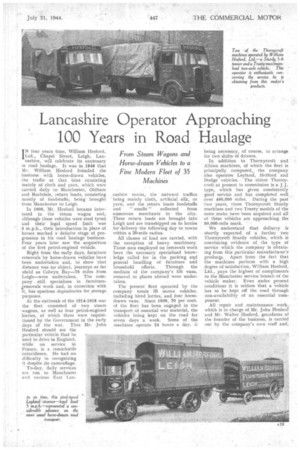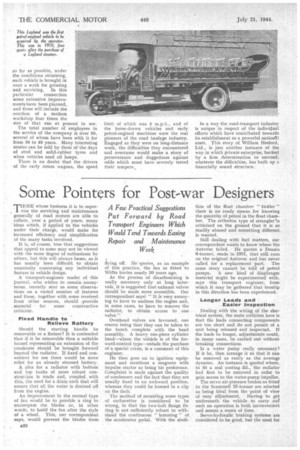Lancashire Operator Approaching 100 Years in Road Haulage
Page 21

Page 22

If you've noticed an error in this article please click here to report it so we can fix it.
From Steam Wagons and Horse-drawn Vehicles to a Fine Modern Fleet of 35 Machines IN four. years time, William Hesford, Ltd., Chapel Street, Leigh, Lancashire, will celebrate its centenary in road haulage. It was in 1848 that Mr. William Hesford founded the business with horse-drawn vehicles, the traffic at that time consisting mainly of cloth and yarn, which were carried daily to Manchester, Oldham and Rochdale, return loads, consisting mostly of foodstuffs, being brought from Manchester to Leigh.
In 1906, Mr. Hesford became interested in the steam wagon and, although these vehicles were Steel tyred and their legal speed limit was 5 m.p.h., their introduction in place of horses marked a definite stage of progression in his road haulage business. Four years later saw the acquisition of the first petrol-engined vehicle.
Right from the early days, furniture removals by horse-drawn vehicles have been undertaken and, to show that distance was no object, journeys as far afield as Colwyn Bay-75 miles from Leigh—were undertaken. The company still specializes in furniture4-emovals work and, in conection with it, his spacious depositories for storage purposes.
At the outbreak of the 1014-1918 war the fleet consisted of two steam wagons, as well as four petrol-engined lorries, of which three were requisitioned by the Government in the early. days of the war. That Mr. John Hesford should see the particular vehicle that he used to drive in England, while on service in France, is a remarkable coincidence. He had no difficulty in recognizing it despite its camouflage.
To-day, daily services are run to Manchester and various East Lan
cashire towns,. the outward traffics being mainly cloth, artificial silk, or yarn, and the return loads foodstuffs and " smalls " collected from numerous merchants in the city. These return loads are brought into Leigh and are transhipped on to lorries for delivery the following day to towns within a 20-mile radius.
AU classes of load are carried, with the exception of heavy machinery. Those men employed on removals work have the necessary specialized knoWledge called for in the packing aqd general handling of furniture and household effects. Through the medium of the company's lift vans, removal to places abroad -were undertaken.
The present fleet operated by the company totals 35 motor vehicles, including hired lorries, and four horsedrawn vans. Since 1939, 70 per cent. of the fleet has been engaged in the transport of essential war material, the vehicles being kept on the road for seven days a week. Some of the machines operate 24 hours a day, it being necessary, of course, to arrange for two shifts of drivers.
In addition to Thornycroft and Albion machines, of which the fleet is principally composed,, the company also operates Leyland, Bedford and Dodge vehicles. The oldest Thornycroft at present in commission is a J.J. type, which has .given consistently good service and has completed well over 400,000 miles. During the past two years, three Thornycroft Sturdy machines and two Trusty models of the same make have been acquired and all of these vehicles are approaching the 80,000-mile mark.
We understand that delivery is shortly expected of a further two Thornycroft Sturdy vehicles, which is convincing evidence of the type of service which the company is obtaining from this particular manufacturer's products. Apart from the fact that the machines perform with a high degree of satisfaction, William Hesford, Ltd., pays the highest of compliments to the Manchester service branch of the vehicle maker, Even under present conditions it is seldom that a vehicle has to be kept off the road through non-availability of an essential component.
All repair and .maintenance work, which is in charge of Mr. John Hesfora and Mr. Walter Hesford, grandsons of the founder of the business, is carried out by the company's own staff and, so far as possible, under the conditions obtaining, each vehicle is brought in once a week for greasing and servicing, In this particular connection.
some extensive improvements have been planned, and these will include the erection of a modern workshop four times the size of that one at present in use.
The total number of employees in the service of the company is over N, several of whom have been with it for from 30 to 49 years. Many interestin stories can be told by them of the days of steel and solid-rubber tyres and when vehicles used oil lamps.
Thereis no doubt that the drivers of the early steam wagons, the speed
limit of which was 5 m.p.h., and of the horse-drawn vehicles and early petrol-engined machines were the real pioneers of the road hanlage industry. Engaged as they were on long-distance work, the difficulties they encountered and overcame would make a story of perseverance and doggedness against odds which must have severely tested their tempers., In a way the road-transport industry is unique in respect of the individual efforts which have contributed towards its establishment as a powerful nationtl asset. This story of William Hesford, Ltd., is just another instance of the way in which private enterprise, backed by a firm . determination to succeed, whatever the difficulties, has built up a financially sound structure.




















































